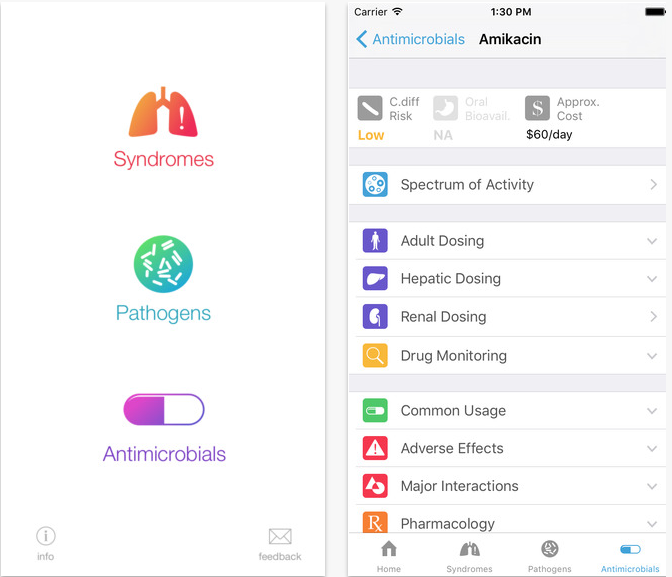June 27, 2016
New app helps doctors minimize patients' resistance to antibiotics

A new app designed for physicians is being used in Calgary hospitals in an attempt to curb antibiotic resistance.
Antibiotics can be life-saving treatments for many infectious diseases. However, resistance is on the rise worldwide because of the overuse and misuse of these important medications, which are also known as antimicrobials.
In response to the concern around over-prescribing medication, Spectrum MD is an app designed to help doctors optimize patient outcomes while minimizing antimicrobial resistance.
The app concept was created by two medical residents, Dr. Elizabeth Parfitt and Dr. Paul Campsall, who worked with a software development group and collaborated with a multidisciplinary team from the University of Calgary and Alberta Health Services (AHS).
“We’re very excited about this app,” says Dr. John Conly, app collaborator and professor in the departments of medicine, pathology and laboratory medicine, and microbiology, immunology and infectious diseases. Conly is also a member of the O’Brien Institute for Population Health and Snyder Institute for Chronic Diseases.
“It’s conceived and born out of Calgary but with input from a broad range of individuals within multiple disciplines which is what it takes to achieve success with something like this.”
'Complex decision support in your pocket'
Designed with the busy physician in mind, the app is quick and easy for doctors to use. Health-care professionals input select patient information directly into the app and receive treatment recommendations specific to that patient.
In addition, because guidelines and microbial prevalence differs among cities and provinces, the app can be customized to include stats for specific locations to incorporate local sensitivity patterns. Currently, customizable microbial profiles are available for hospitals throughout Calgary and the Providence Health Care group of hospitals in Vancouver.
“Increasingly, this information has been available to prescribing physicians on the Internet,” says Dr. Dan Zuege, app collaborator and clinical professor in the departments of critical care medicine and medicine.
“But that’s not really in your pocket. This is what Spectrum MD is trying to do: put those clinical practice guidelines and complex decision support in your pocket. As busy physicians, time is limited to access information — the more efficient we can make that access, the better.”

To help doctors optimize treatment and minimize antimicrobial resistance, a team created Spectrum MD
Overuse of antimicrobials can lead to drug resistance, but also other health issues such as drug toxicity, or complications such as C. difficile colitis. Prolonged hospital stays, secondary infections and the treatment of other various adverse side-effects of antimicrobials also result in increased costs to the health-care system.
“Microbes are smart and they evolve ways to get around things that kill them,” says Zuege, who is also the medical director of eCritical Alberta Program and an intensive care physician in the Department of Critical Care Medicine AHS, Calgary Zone. “That’s good for the organism but bad for the patient.”
World Health Organization shows interest in app
To date, the app is being used in all of Calgary’s adult hospitals and will be available soon in paediatrics. A utilization study is currently being completed in the adult critical care units. In addition, the World Health Organization has shown interest in potentially adapting the app to benefit member state countries where resources are limited.
“We’re in an age where basically everyone has access to a smartphone,” says Conly, who is also medical director of Infection Prevention and Control and Antimicrobial Stewardship, AHS, Calgary and area. “We’re very excited that Spectrum MD is able to help leverage that accessibility with the complexity of these microbes.”
The free app is currently only available for iPhones, and is available through the AppStore. Implementation of Spectrum MD in Calgary was recently recognized with a LEADing practice award from Canada Health Infoway and Accreditation Canada.
The University of Calgary is uniquely positioned to find solutions to key global challenges. Through the research strategy for Infections, Inflammation, and Chronic Diseases in the Changing Environment (IICD), top scientists lead multidisciplinary teams to understand and prevent the complex factors that threaten our health and economies.
